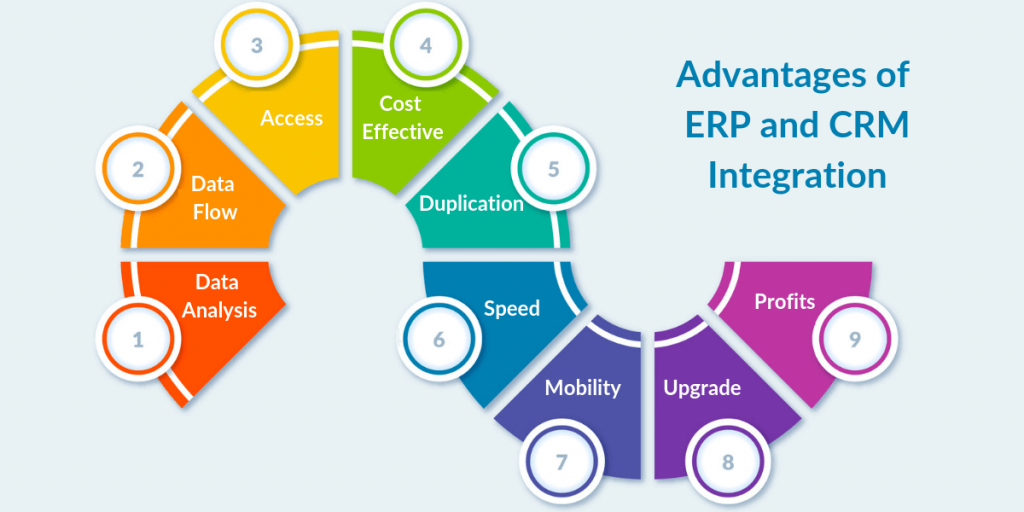In today’s fast-paced business environment, companies are constantly seeking ways to streamline operations, enhance customer experiences, and drive growth. One effective strategy to achieve these goals is by integrating Customer Relationship Management (CRM) software with Enterprise Resource Planning (ERP) systems. This integration can offer a multitude of benefits that significantly improve both operational efficiency and customer satisfaction. Here’s a closer look at why integrating CRM with ERP software is advantageous for businesses:
1. Enhanced Data Accuracy and Consistency
Integrating CRM with ERP systems ensures that data is synchronized across all platforms. This means that customer information, sales data, inventory levels, and financial records are all consistent and up-to-date. Eliminating data silos reduces the risk of errors and discrepancies, which leads to more accurate reporting and better decision-making.
2. Improved Customer Service
A CRM system is designed to manage customer interactions and provide valuable insights into customer behavior and preferences. When integrated with an ERP system, customer service teams can access real-time information about order status, inventory availability, and account history. This comprehensive view enables support staff to address customer inquiries and issues more efficiently, leading to higher customer satisfaction.
3. Streamlined Sales and Order Management
An integrated system allows for seamless coordination between the sales and order management processes. Sales representatives can access up-to-date inventory information, process orders, and track shipments all within the CRM system. At the same time, the ERP system can handle back-end processes like order fulfillment, invoicing, and inventory updates. This integration reduces manual data entry, minimizes errors, and accelerates the sales cycle.
4. Enhanced Reporting and Analytics
Combining CRM and ERP data provides a holistic view of business performance. With integrated reporting and analytics, businesses can generate comprehensive reports that include insights from both customer interactions and operational processes. This unified data analysis helps identify trends, forecast demand, and make informed strategic decisions.
5. Increased Operational Efficiency
Integrating CRM with ERP automates many routine tasks and processes, reducing the need for manual intervention. For example, when a sales order is entered into the CRM, it can automatically trigger inventory updates, procurement processes, and financial transactions in the ERP system. This automation streamlines workflows, reduces administrative overhead, and allows employees to focus on more value-added activities.
6. Better Financial Management
Integration helps synchronize financial data between the CRM and ERP systems. This alignment ensures that revenue, expenses, and profit margins are accurately tracked and reported. It also facilitates more efficient billing and payment processes, as well as improved cash flow management. Financial teams benefit from having a unified view of all financial transactions and customer-related financial data.
7. Personalized Marketing and Sales Strategies
With integrated CRM and ERP systems, businesses can leverage customer data to create more targeted marketing campaigns and personalized sales approaches. By analyzing customer purchase history, preferences, and interactions, companies can tailor their marketing efforts and sales strategies to better meet customer needs and drive higher conversion rates.
8. Enhanced Collaboration Across Departments
Integration fosters better collaboration between different departments within a business. Sales, marketing, finance, and customer service teams can all access and share the same information, leading to more cohesive and coordinated efforts. This improved communication and collaboration contribute to a more agile and responsive organization.
9. Scalability and Growth
As businesses grow, the complexity of managing customer relationships and operational processes increases. Integrated CRM and ERP systems provide a scalable solution that can adapt to evolving business needs. Whether expanding into new markets, launching new products, or increasing sales volume, the integrated system supports growth by ensuring that all aspects of the business remain interconnected and efficient.
10. Competitive Advantage
In a competitive marketplace, having access to accurate, real-time information and streamlined processes can be a significant advantage. By integrating CRM with ERP software, businesses can enhance their ability to respond quickly to market changes, deliver exceptional customer experiences, and optimize operations. This agility and efficiency translate into a stronger competitive position and greater overall success.
Conclusion
Integrating CRM with ERP software offers numerous benefits that can drive business success and growth. From improved data accuracy and customer service to enhanced operational efficiency and financial management, the synergy between CRM and ERP systems creates a powerful tool for managing all aspects of a business. By leveraging the strengths of both systems, organizations can achieve greater agility, better decision-making, and a competitive edge in the marketplace.
